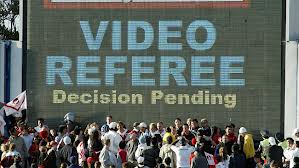By Andrew Warshaw
March 2 – The timing could not have been more apt. Just as the custodians of world football decided to delay the advent of video technology to help referees for at least a year, so those in favour of speeding things up pointed to another example of the need for progress with a case of mistaken identity in England’s Premier League.
On Saturday the International FA Board, the game’s lawmaking body, decided to put off endorsing experimenting with live trials because it wanted more information before giving the green light to its biggest ever law change.
The Dutch FA, which has been carrying out experiments unofficially, had proposed using the system in its cup competitions next season whereby contentious moments such as red cards, offside decisions that lead to goals and penalty claims could be referred to a video assistant referee watching from the sidelines.
While many fans support football adopting a practise used for years in other sports, FIFA secretary-general Jerome Valcke made it clear it was far too radical a move to approve anything other than goal-line technology which itself took decades to come into force.
“I think it needs a lot of discussion – if the referee just relies on information that he is getting [from the video official] is there a risk he becomes not as strong and always asks for confirmation?” said Valcke. “It’s the biggest decision that would ever come out of IFAB. It’s not a question of years – it’s making the biggest decision ever in the way football is played.”
Although the English and Scottish federations were in favour of live trials, bizarrely the Dutch project hasn’t even been seen by FIFA, ruling out any chance of it being approved.
Scottish FA chief executive Stewart Regan said that while his association would have been happy to go ahead, there was considerable caution about introducing video technology for fear of interfering with the free-flowing nature of football. “It’s a big move to introduce something like this, better to take our time,” said Regan.
Yet with referees coming under increasing pressure, the need for some kind of scientific aid has become ever more urgent. Ironically just as IFAB referred the issue to its two new advisory panels, so an apparent case of mistaken identity took place in the Premier League – even though the referees’ body denied it – with the wrong Sunderland player sent off at Manchester united, strengthening the argument of a referral system.
Following what was described as a “healthy” debate, Football Association of Wales chief executive Jonathan Ford explained why it was too early to allow technology in live games. “We all agree it’s a divisive issue,” said Ford. “(But) We shouldn’t as IFAB just allow experiments to be conducted willy-nilly without any control, or terms of reference. We have seen too many times in other sports referees defaulting to video assistance. We did worry that this would lead to managers, players and even fans demanding more analysis rather than a decision of the referee.”
After the IFAB meeting Greg Dyke, chairman of the English FA, expressed his frustration at the level of caution. Dyke said: “I was a bit disappointed that we didn’t get this any further. I am a great fan of video technology. It seems to me that if there are means of helping referees we should try them in trials and, if they work, adopt them.
“The point I made at the meeting was that instead of waiting until we get another Frank Lampard moment to change the rules as we did with goal line technology, we should go on the front foot. Video technology should be used to help referees, not to change or overrule them.”
IFAB also turned down, somewhat surprisingly, a proposal to allow a fourth substitute to be used in extra time, deciding three was adequate. The idea had been submitted by a number of countries and regions, including South America’s Conmebol confederation.
But rolling, or returning, substitutions, a proposal by the Scottish FA and described by IFAB as a “ground-breaking decision”, will now be allowed in amateur games at grass-roots level, meaning any number of replacements can be rotated in order to drive up participation. Following two separate pilot schemes by the English and Scottish FAs, the idea will be adopted globally. “This is a significant change to how recreational football has been played,” said Irish FA chief executive Patrick Nelson.
Contact the writer of this story at moc.l1734791483labto1734791483ofdlr1734791483owedi1734791483sni@w1734791483ahsra1734791483w.wer1734791483dna1734791483

